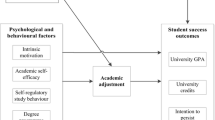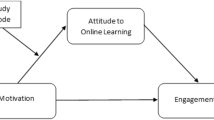Abstract
This paper reports a study of innovative and traditional engineering programmes at the University of Salford, UK Attention is given to student entry, and to course evaluation and improvement. Using the Myers-Brigg Type Inventory (MBTI) and the Technical Students' Learning Environment Preferences questionnaire (TSLEP), data were obtained about personality type and student developmental level. In addition, a selected group of the students were interviewed to measure their cognitive levels as defined by Perry's model of intellectual and ethical development, and to assist in the validation of the TSLEP questionnaire.
Application of the TSLEP and the MBTI instruments to engineering students at North Carolina State University and the State University of New York at Brighamton generated further data which are used to make US/UK comparisons and to suggest ways in which the scope of engineering education might be expanded to meet the needs of an increasingly diverse student body.
Similar content being viewed by others
References
Belenky, M. F.et al.: 1986,Women's Ways of Knowing — the Development of Self, Voice and Mind, Basic Books, New York.
Cox, G. P.: 1991, ‘Computers, Management, and Electronics — An Innovative Undergraduate Degree Course’,Conference Proceedings — Innovative Teaching in Engineering, Sheffield, 195.
Culver, R. S. and Hackos J. T.: 1982, ‘Perry's Model of Intellectual Development’,Engineering Education, December, 221.
Dickinson, H.: 1964, ‘Students in a C.A.T.: Qualifications for Success’,Universities Quarterly.
Elton, C. F. and Rose H. A.: 1971, ‘Students Who Leave Engineering’,Engineering Education 70(8), 31.
Fitch, M. A.: 1991, Private communication, January, 1991.
Fitzgibbon, A., Heywood, J. and Cameron, L. A.: 1991, ‘The Matching of Learning Styles to Teaching during Teacher Education’, Research in Teacher Education Monographs, Department of Teacher Education, University of Dublin, Dublin.
Furneaux, W. D.: 1962, ‘The Psychologist and the University’,Universities Quarterly 17, 33.
Heywood, J.: 1969,An-Evaluation of Certain Post-War Developments in Technological Education, Ph.D. thesis, University of Lancaster, Lancaster.
Heywood, J.: 1989,Assessment in Higher Education, 2nd Ed., John Wiley & Sons, New York.
Kegan, R.: 1982, ‘The Evolving Self’,Problem and Process in Human Development, Harvard University Press, Cambridge, MA.
Kiersey, D. and Bates M.: 1984,Please Understand Me, Prometheus Nemesis Books, available through CAPT, Gainesville, FL.
Knefelkamp, L. L.: 1974,Developmental Instruction: Fostering Intellectual and Personal Growth in College Students, 1974, unpublished doctoral dissertation, U. of Minnesota.
McCauley, M. H.: 1990, ‘The MBTI and Individual Pathways in Engineering Design’,Engineering Education 80(5), 537.
Moore, W. S.: 1984, ‘A Preliminary Study of Cognitive Stage/Style Interactions: The Perry Scheme and the Myers-Briggs Type Indicator’, Unpublished manuscript, CADI, Farmville, VA.
Moore, W. S.: 1987,The Learning Environment Preferences: Establishing the Preliminary Reliability and Validity of an Objective Measure of the Perry Scheme of Intellectual and Ethnical Development, unpublished thesis U. of Maryland.
Moore, W. S.: 1988,The Learning Environment Preferences: An Instrument Manual, CSID, Olympia, WA.
Moore, W. S.: 1989, ‘Listening to Student Voices: Understanding and Assessing Students-as-Learners from the Perspective of the Perry Scheme’, CSID, Olympia, WA.
Moore, W. S.: 1991a, ‘Assessment of the Perry Scheme of Intellectual Development: A Critical Review of Research and Issues’,AAHE Assessment Forum, Washington, D.C.
Moore, W. S.: 1991b, Private communication, March, 1991.
Moore, W. S.: 1993, Private communication, January, 1993.
Myers, I. B.: 1980,Gifts Differing, CAPT, Gainesville, F. L.
Myers, I. B. and McCauley M. H.: 1985,A Guide to the Development and Use of the Myers-Briggs Type Indicator, Consulting Psychologists Press, Palo Alto, CA.
Pavelich, M. and Fitch M. A.: 1988, ‘Measuring Students’ Development Using the Perry Model',Proceedings — American Society for Engineering Education Annual Conference, Portland, OR., 668.
Perry, W. G., Jr.: 1970,Forms of Intellectual and Ethical Development in the College Years: A Scheme, Holt, Rinehart & Winston, New York.
Rutsohn, L.: 1978, ‘Understanding Personality Types: Does it Matter?’,Improving College and University Teaching 26(4), 249–254.
Sharp, J. M. and White A. J.: 1991, ‘Changing Input Standards’,Conference Proceedings — Innovative Teaching in Engineering, September, Sheffield, 520.
Stice, J. E.: 1987, ‘Using Kolb's Learning Cycle to Improve Student Learning’,Engineering Education 77(5), 291.
Widick, C.: 1977, ‘The Perry Scheme: A Foundation for Developmental Practice’,The Counselling Psychologist 5(4), 35.
Yokomoto, C. F.: 1987, ‘How the MBTI has Influenced the Way I Teach’,Proceedings — American Society for Engineering Education Annual Conference, Reno, NV, 324.
Author information
Authors and Affiliations
Rights and permissions
About this article
Cite this article
Culver, R., Cox, P., Sharp, J. et al. Student learning profiles in two innovative honours degree engineering programmes. Int J Technol Des Educ 4, 257–287 (1994). https://doi.org/10.1007/BF01212806
Issue Date:
DOI: https://doi.org/10.1007/BF01212806




